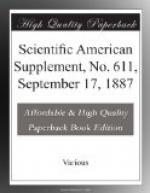With regard to a foundation for a government or national horse, I am certain so gifted and able United States officer as Mr. S.C. Robertson did not know that it was unnecessary to go to England for the blood of their national horse, even though we smuggled it through Kentucky or any other of our States. Again, it would be impossible to produce any type of a horse from the English thoroughbred, except a dunghill, and Mr. Robertson would not have his government breed national dunghills!
I love England as our mother country, but am an American, born and dyed in the wool to our independence, from the “Declaration.”
Now let us see what England says of her thoroughbred: “He is no longer to be relied upon for fulfilling his twofold functions as a racer and reproducer of himself. He is degenerating in stoutness and speed. As a sire he has acquired faults of constitution and temper which, while leaving him the best we have, is not the best we should aspire to have. His stoutness and speed are distinctly Arabian qualities, to which we must resort for fresh and pure blood.” We have shown that the Englishman says “his thoroughbred is full of radical and growing defects in wind, tendons, feet, and temper, and that his twofold functions are to run races and reproduce himself, which are the end of his purpose.” Does our government want breeding farms upon which to nurse these admitted “defects,” including the “confirmed roarer,” for cavalry horses? I quote again: “Those who have had most to do with him are ready to admit that he no longer possesses the soundness, stoutness, speed, courage, and beauty he inherited from his Arabian parentage. As a sire for half-bred stock, he may do for those who will use him, but we must resort to the Arabian if we would revitalize and sustain our thoroughbred race horse.”
In the face of these statements, in print abroad, would Lieut. Robertson make the base for our proposed national horse that of the English thoroughbred, scattering the weeds from such imperfect breedings among the farmers of our land?
I am writing as an old horseman and breeder, and not as a newspaper man or young enthusiast, although the enthusiasm of youth is still in me, for which I am thankful.
This question of horse breeding I have been deeply interested in for forty years past. Let me quote to the reader from one of many letters I have received from Sir Wilfrid Seawen Blunt during the past seven years. His practical knowledge of the English thoroughbred race horse and his blood cause, the Arabian, is the equal if not superior to any other one man of this present age.




